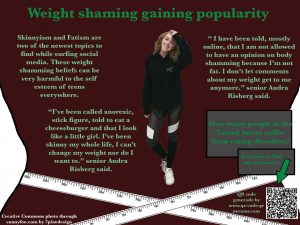Society’s hypocritical and insecure trait: judgement and comparison
The constant usage of phones everyday impacts the mental health of an individual. Social media, a shareable platform, can create a sense of low self esteem and self consciousness when comparing oneself to others.
April 2, 2020
Scroll. Like. Scroll. Like. Scroll… An eye-catching post appears. This post was not like the posts before. The elements of the post contain an emotional connection. It makes the conscience feel weaker. The observer analyzes every little detail from the background, to the person’s clothes, wealth, etc. Critiques and assumptions are formed. The conscience grows smaller as it battles with the self-made accusations and comparisons the mind has created.
“Social media has become so popular. It’s where people find inspiration, but there are so many people on it that they judge because they might not like a certain style,” sophomore Cassidy Vilme said.
Social media has been a part of daily lives for as long as 40 years. It has become a place to post what one loves and to express viewpoints.
Vilme explained, she started a public platform to share her experiences with friends.
“It’s fun to see what other people are sharing,” Vilme added.
Although social media has its enjoyable traits, it carries a heavy consequence of judgement and comparison. These two traits affect individuals, especially those who are younger, as social media plays an enormous role in their lives.
“It causes depression and it causes a feeling of low self worth and also guiding students to their self worth by what their appearance is and the responses from others,” psychology teacher Kris McCarthy explained.
Psychologist Leon Festinger created the Social Comparison Theory, which indicates individuals base their own self esteem on comparing themselves to others.
McCarthy added that the theory of Social Darwinism could play a big role in why an individual may compare themselves to others. “It’s that sense of competition, of survival, for example someone may have something that one may not and they might feel the need to have that to be better or the best,” McCarthy added.
Judgement of others can be depicted by what psychologists call the Thin Slice Methodology. This method is when an individual uses their judgement on the first impression of others.
McCarthy explained when people make their first impression, the first thing an individual may do is not acknowledge the way a person speaks or their actions. They see who they are and make assumptions based on their nonverbal clues, such as the way they dress.
Aside from the psychological point of it all, social media has built an ideal appearance that is universally acknowledged. This accepted social norm has influenced many to perceive what a “normal” person should be.
“For women, I feel that you have to be curvy, skinny or tall and for men you have to be masculine,” Vilme explained. “I feel that everyone does not like the body they are in, so they compare themselves, but everyone is different.”
Even though social media has created a quintessential look, there have been a variety of appearances showcased, including different body types, styles, etc. Although there has been more diversity, it does not change what the ideal look is.
“It is getting better at showing more different sizes and styles, but there are a lot of people on social media and it is hard to see everything. Sometimes you see more skinny girls and it is hard to know that it is okay to not be like that,” senior Taylor Venancio said.
It is easy to let the appearances of others question an individual’s self worth and judge others by their given first impression. One must recall all people are different and unique in their own way and everyone is struggling personally in their lives.
“You have to remember that people only post good things. Try to be inspired by what people are doing with their lives, but also keep in mind that there is a reality and that they have other things going on in their life too,” Venancio added.











